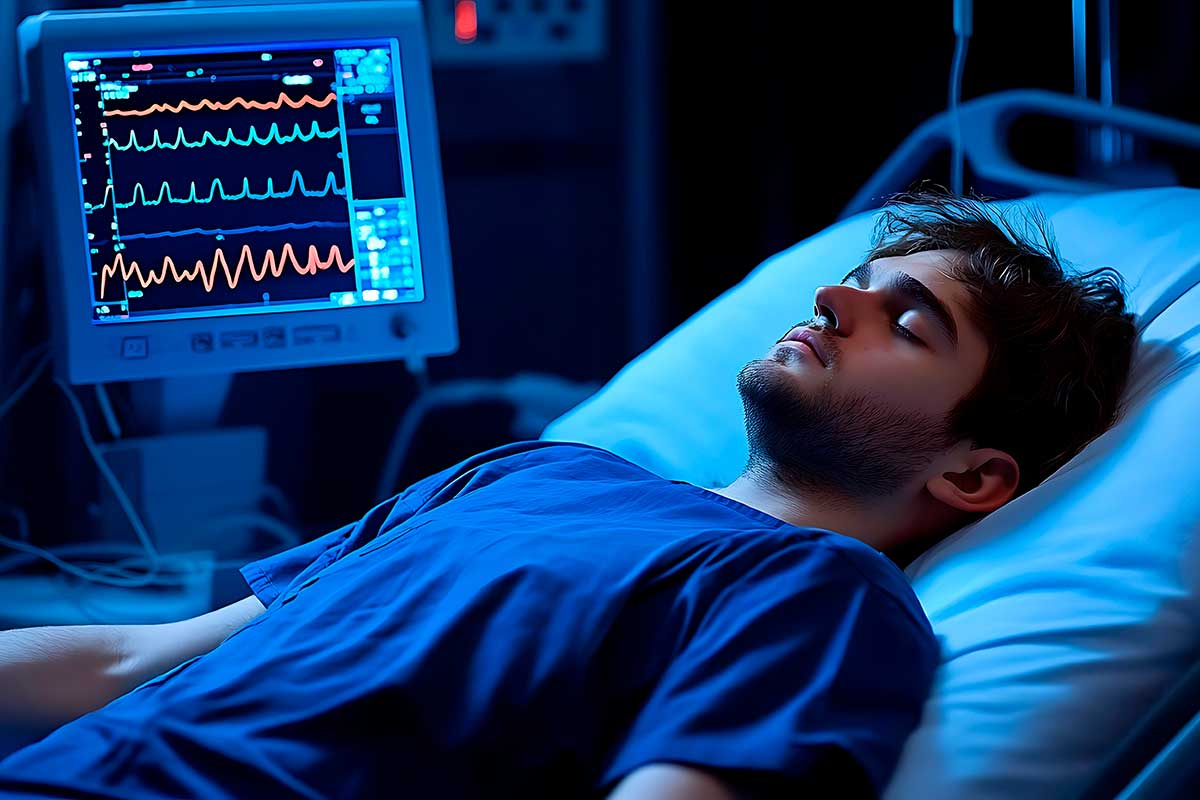Clinic Consultation is a trusted leader in health and wellness, offering specialized services for accurate diagnoses and effective treatments. Among the exams available at our Brampton / ON location, we highlight Polysomnography, an essential procedure to identify and treat sleep disorders that can impact your quality of life. With a modern facility and highly skilled professionals, we ensure comfort and safety, providing patients with a smooth and reliable experience during the exam.
Polysomnography is ideal for individuals experiencing sleep difficulties, excessive snoring, sleep apnea, and other issues that disrupt rest. At Clinic Consultation in Brampton / ON, we perform this test using advanced technology, monitoring various body parameters during sleep, such as breathing, heart rate, and brain activity. This allows us to deliver detailed diagnoses, which are crucial for creating personalized treatment plans tailored to each patient’s needs.
If you are in Brampton / ON and need to undergo a polysomnography test, Clinic Consultation is your best choice. We offer fast scheduling, a welcoming environment, and specialized support to ensure you receive the care you deserve. Contact us today to book your test and improve your sleep quality, along with your overall health and well-being!
Polysomnography is a diagnostic test that monitors and records bodily activities during sleep. It is considered one of the most comprehensive methods to evaluate potential sleep disorders, analyzing parameters such as brain activity, breathing, heart rate, body movements, and more.
Conducted in specialized clinics or laboratories, polysomnography is crucial for understanding the impact of sleep on overall health. Untreated sleep problems can affect quality of life and contribute to the development of cardiovascular, metabolic, and psychological conditions, making this test essential for accurate diagnoses.
What is Polysomnography For?
Polysomnography is used to diagnose a variety of sleep disorders and their impact on overall health. It is especially important for identifying conditions that compromise sleep quality and affect the heart, lungs, and brain.
Beyond diagnosis, this test helps in planning appropriate treatments by providing detailed information about the severity and frequency of sleep-related issues, such as apnea or insomnia. It is also used to monitor the effectiveness of ongoing treatments.
How Does Polysomnography Work?
Polysomnography is performed during sleep, usually at night, in a controlled environment. The patient is connected to sensors that monitor various bodily activities, such as brain waves, breathing, blood oxygen levels, heart rate, and muscle movements.
While typically conducted in laboratories, some versions of the test can be performed at home using portable equipment, depending on medical advice. The data collected is analyzed by a specialist who interprets the results and provides a detailed diagnosis.
Types of Polysomnography
1. Full Polysomnography in a Laboratory
Conducted in a clinic or hospital, this test records a wide range of parameters during sleep, including brain activity (EEG), eye movements, respiratory rate, oxygen levels, and snoring. It is the gold standard for diagnosing complex sleep disorders.
2. Home Sleep Study
Uses portable equipment to monitor basic sleep parameters from the comfort of the patient’s home. While less comprehensive, it is a convenient alternative for simpler cases or patients who cannot attend a laboratory.
3. Polysomnography with CPAP Titration
Designed for patients diagnosed with obstructive sleep apnea, this test evaluates the effectiveness of CPAP (Continuous Positive Airway Pressure) therapy during sleep and adjusts pressure levels as needed to ensure proper breathing.
4. Pediatric Polysomnography
Tailored for children, this test evaluates sleep disorders specific to childhood, such as apnea, sleepwalking, and behavioral sleep disorders.
What Conditions Can Polysomnography Detect?
- Obstructive Sleep Apnea: Breathing interruptions caused by airway collapse.
- Chronic Insomnia: Persistent difficulty falling or staying asleep.
- Narcolepsy: A disorder characterized by excessive daytime sleepiness and sudden sleep episodes.
- Restless Leg Syndrome: Involuntary leg movements that disrupt sleep.
- Sleepwalking: Performing activities during sleep, such as walking or talking.
- Cardiac Disorders Related to Sleep: Changes in heart rhythm during sleep.
- Obesity Hypoventilation Syndrome: Inadequate breathing due to excess weight.
When is Polysomnography Recommended?
- Excessive snoring: Often associated with breathing pauses or apnea.
- Excessive daytime sleepiness: Even after apparently long nights of sleep.
- Persistent difficulties sleeping: Indicative of chronic insomnia.
- Suspected obstructive apnea: Fatigue and breathing interruptions during the night.
- Abnormal behaviors during sleep: Such as sleepwalking or frequent nightmares.
- Nighttime breathing problems: Such as shortness of breath when lying down.
- Monitoring pre-existing conditions: To evaluate the effectiveness of sleep disorder treatments.
Pre- and Post-Test Care for Polysomnography
Pre-Test Care:
- Avoid caffeine, alcohol, or stimulants on the day of the test.
- Maintain your usual sleep schedule the night before.
- Bring comfortable sleepwear and personal hygiene items for laboratory tests.
Post-Test Care:
- After the test, patients can resume normal activities.
- The physician will analyze the data and discuss the results in a follow-up consultation.
Contraindications for Polysomnography
Polysomnography is safe for most individuals but may have limitations in cases such as:
- Patients with reduced mobility that complicates sensor placement.
- Very young children who cannot tolerate the full examination.
- Individuals with severe claustrophobia who may feel uncomfortable with the sensors.
Alternatives for Those Unable to Undergo Polysomnography
- Actigraphy: Monitors sleep and wake patterns with a device similar to a watch.
- Sleep Questionnaires: Preliminary evaluation based on reported symptoms.
- Nocturnal Oximetry: Measures blood oxygen levels during sleep.
Polysomnography is available at Clinic Consultation. Schedule your test with us today to receive a precise and personalized diagnosis, ensuring healthier and more restorative nights of sleep! Contact us now!
